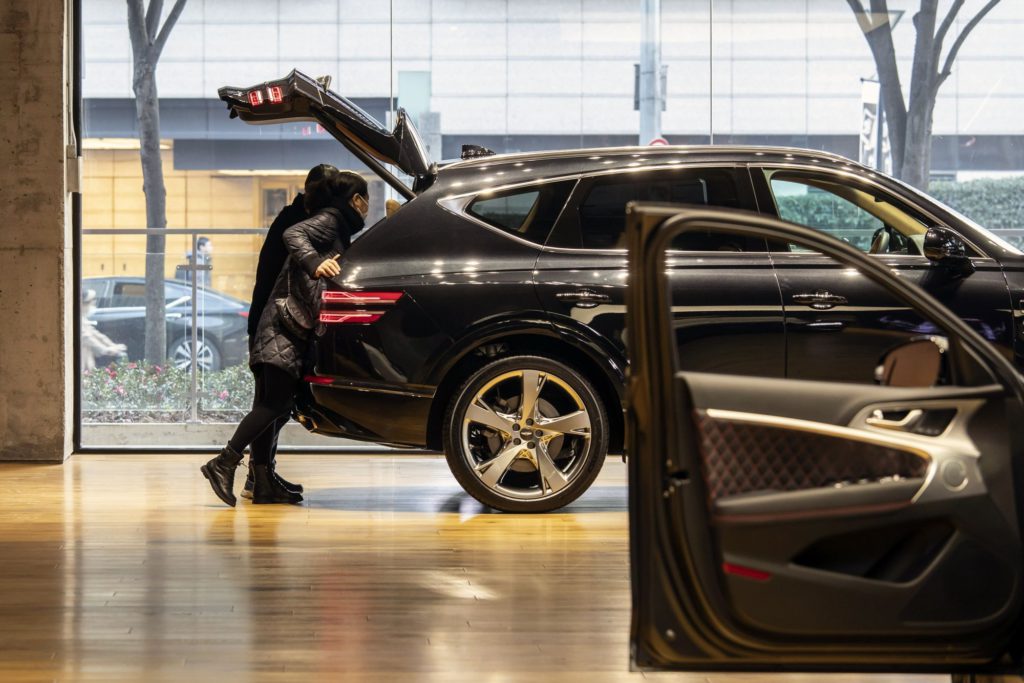(Bloomberg) — Hyundai Motor Co. shares rose the most in two weeks after the company’s first-quarter operating income beat analyst expectations, jumping 16% from a year earlier as a weaker Korean won offset supply-chain snags.
The shares closed up 1.1% in Seoul after rising as high as 2.5%.
Headline Numbers
Operating profit in the three months through March was 1.93 trillion won ($1.55 billion), compared with the 1.66 trillion won median estimate from analysts tracked by Bloomberg. Net income rose 17% to 1.78 trillion won, topping the 1.39 trillion won estimate.
Sales slid 9.7% from a year earlier to 902,945 units, mainly due to global shortages in chips and components, Hyundai said in a statement Monday. Still, revenue climbed 11% to 30 trillion won thanks to robust sales of sport utility vehicles and Genesis luxury models, reduced incentives and a favorable foreign-exchange rate, the automaker said.
The won weakened 1.9% against the dollar in the first quarter, making exports cheaper. Hyundai sells the majority of its vehicles overseas.
Kim Jin-Woo, an analyst at Korea Investment & Securities Co., said in a note prior to the results that Hyundai’s earnings would likely not be “that bad” thanks to the weakness in the won.
Uncertain Outlook
Hyundai said it expects a gradual recovery from the pandemic and chip shortage, but that supply uncertainties will remain due to lockdowns in several Chinese cities and fluctuating raw material costs.
Read more: Shanghai Pens in Residents in Renewed Effort to Stamp Out Covid
The company has set up a team to monitor and respond to the prices of commodities, potentially buying them directly, Vice President Zayong Koo said during an earnings call. Demand for vehicles is growing as the semiconductor shortage persists, he said.
Supply Disruptions
Hyundai has suspended operations in Russia, citing logistical issues with the delivery of components. The war in Ukraine has deepened supply-chain challenges for global automakers, which were already strained by the Covid-19 pandemic, as well as rising commodity prices.
Hyundai Executive Vice President Gang-hyun Seo said in the earnings call that the company is considering delaying investment in Russia as it looks to reduce costs in the country. He didn’t elaborate, but said uncertainty over the war in Ukraine is “high.”
The global shortage in chips for automobiles may start easing from May, Woo-Jeong Joo, an executive vice president at affiliate Kia Corp., said during a conference call the same day. While higher commodity prices will be a bigger burden for Kia in the second half, a weaker won will be able to offset some of the higher input costs, he said.
Kia’s operating profit beat estimates, with operating margin at 8.8%.
“We are not saying we will reflect 100% of the increase in commodity prices in our selling prices,” said Joo. “We will be able to lower the overall cost by improving efficiency in production as well as cutting costs for making other parts.”
Electric Vehicles
Hyundai also said it will introduce more battery-powered electric vehicles globally, including the Genesis GV60 and GV70 and Ioniq 6.
The Ioniq 5 accounted for about 30,000 of the 52,000 EVs sold in the first quarter, Koo said.
The South Korean automaker said last month it plans to invest about $15 billion in battery-powered EVs as part of a broader outlay of nearly $80 billion in its businesses by 2030. Its investment in electrification is lower than others such as Honda Motor Co. and Toyota Motor Corp., which plan spending of $40 billion and $35 billion, respectively, as well as Volkswagen AG’s $101 billion goal.
Earlier Monday, Hyundai announced it had joined Climate Group’s RE100 global initiative to move to fully using renewable energy by 2050. South Korea’s President-elect Yoon Suk Yeol has pledged to ban purchases of internal combustion engine cars by 2035.
(Updates with detail from Kia earnings.)
More stories like this are available on bloomberg.com
©2022 Bloomberg L.P.











